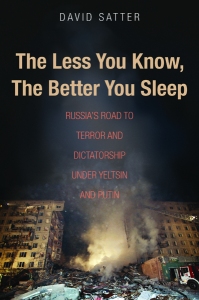 David Satter, The Less You Know, the Better You Sleep: Russia’s Road to Terror and Dictatorship Under Yeltsin and Putin (New Haven, CT: Yale University Press, 2016).
David Satter, The Less You Know, the Better You Sleep: Russia’s Road to Terror and Dictatorship Under Yeltsin and Putin (New Haven, CT: Yale University Press, 2016).
“In the absence of justice,” asked Augustine in The City of God, “what is sovereignty but organized brigandage?” Organized brigandage is a good way to describe the Russian state that has emerged under the leadership of first Boris Yeltsin and now Vladimir Putin. Indeed, without mentioning Augustine, Satter describes Russian government as “banditry in the guise of a state.” The first five chapters of The Less You Know, the Better You Sleep provide the evidentiary basis for this claim.
Chapter 1 argues that Russia’s Federal Security Service—the FSB—organized the bombings of several apartment buildings in the fall of 1999 and blamed them on Chechen terrorists. This provided newly elected president Vladimir Putin justification to launch the second Russian war in Chechnya, a “patriotic” war that unified the country behind his leadership against “terrorism.” Satter’s case is circumstantial, but it is also strong.
Chapter 2 describes the “chaos and criminality” that permeated the Russian government, economy, and society during Boris Yeltsin’s tenure as president. Yeltsin had emerged as a popular reformer after the fall of the Soviet Union. The goal of his reforms was to ensure a “point of no return” for socialism. This entailed a rapid privatization of state industries and properties. Privatization sounds like a capitalist goal, but as Satter points out, “by carrying out the largest peaceful transfer of property in history without benefit of law, the reformers created the conditions for the criminalization of the whole country.” He goes on: “The new society that emerged had three outstanding characteristics: an economy dominated by a criminal oligarchy, an authoritarian political system, and, perhaps most important, a moral degradation that subverted all legal and ethical standards and made real civil society impossible.”
During the 1990s, the Russian people experienced a massive decline in wealth, health, and personal security, and their discontent endangered the Yeltsin regime. This sense of endangerment, Satter argues, explains why the FSB carried out the apartment bombings against its own people. The provocation helped focus the Russian people’s attention on an external enemy and presented the government of newly elected president Putin as their national savior. (Interestingly, one of Putin’s first acts was to grant Yeltsin, his family, and cronies immunity from prosecution.)
Chapter 3 picks up the story with the transfer of power of Yeltsin to Putin. Satter writes: “The creation and consolidation of the Putin-era system involved installing a vertical chain of command and eliminating alternative centers of power.” This “power vertical” coincided with rising Russian fortunes due to its revenue from oil and gas sales. When the economy is bad, people are more likely to pay attention to deficiencies in the regime. On the other hand, when it’s good, they’re less likely to do so. Rising wealth led many Russians to overlook Putin’s consolidation of power, or even justify it. (Interestingly, Putin’s personal wealth is estimated by some Western governments and media to approach $40 billion, carefully hidden, of course.)
Chapter 4 focuses on two hostage-taking incidents that demonstrated the “negligible value of human life” in the eyes of the Russian state. In October 2002, Chechen terrorists seized a theater in Moscow. In September 2004, they seized a school in Beslan. In both cases, they took a thousand or more hostages. And in both cases, the state responded with lethal violence, killing not only the terrorists but hundreds of the hostages too. Satter provides circumstantial evidence that “the government had a role in instigating the original attacks [of the terrorists].” Unfortunately, both hostage-taking incidents “were immensely helpful to Putin’s efforts to depict himself as a foe of terrorism and to legitimize the war in Chechnya to both Russia and the West.”
Chapter 5 deals with the Russian invasion of the Crimea and eastern Ukraine. In 2011, Putin, after a four-year hiatus as Russian prime minister, ran once again to be Russian president, successfully. Tens of thousands protested against his fraudulent election. At around the same time, Ukrainians took to the streets of Kiev to protest their own corrupt president, successfully driving him out of the country. Taking stock of what could be his fate, Putin decided to act and invaded Ukraine, conquering the Crimea and backing a faux independence movement in eastern Ukraine, where many ethnic Russians lived.
Chapter 6 turns from history to the future, asking what is Russia’s fate. Unfortunately, the answer is grim. “Russia faces a darkening future.” What is needed, Satter believes, is “a truth commission, like South Africa’s Commission on Truth and Reconciliation, that is able to examine dispassionately the crimes of postcommunist regimes and make then known to the Russian people.” Given the violence that Satter argues the Russian state has been willing so far to perpetrate against its own people to ensure its own survival, however, how likely is such a commission to come about?
The Less You Know, the Better You Sleep is a dark book, and for those raised in the West, a confounding one. How can a government be organized along the lines of such criminality? We Westerners, with our ideals of individual rights and good government have difficulty wrapping our minds around the kinds of things Satter reports. They don’t make sense to us; they’re not believable, which makes the task of understanding Russia complex.
“Understanding Russia is actually very easy,” Satter counters, “but one must teach oneself to do something that is very hard—to believe the unbelievable.” He goes on: “Once one accepts that the impossible is really possible, the degradation of the Yeltsin years and Vladimir Putin’s rise to power make perfect sense.”
_____
P.S. If you found this review helpful, please vote “Yes” on my Amazon.com review page.

